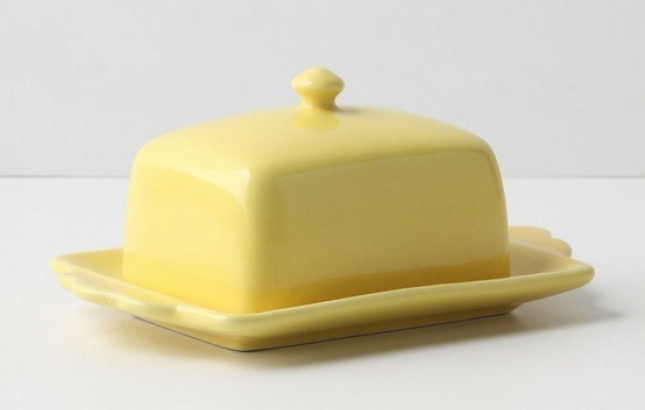
Butter or Margarine?
Is margarine the healthier spread option or is basic butter better? Without question, it’s a laden debate that has saturated discussions in health circles for decades, yet there is still great confusion as to what is the least harmful to our health. Basically, both margarine and butter have benefits and problems.
Is margarine the healthier spread option or is basic butter better? Without question, it’s a laden debate that has saturated discussions in health circles for decades, yet there is still great confusion as to what is the least harmful to our health. Basically, both margarine and butter have benefits and problems.
Recent posts by Renée Leonard-Stainton
Margarine became extremely popular when it was heavily marketed about 40 years ago, as the ‘heart-healthy’ alternative to ‘heart unfriendly’ butter. The detrimental effects of margarine slipped under the radar for a good while, and it’s only more recently, that evidence and research has arisen to suggest that good ol’ butter, may, in fact be a healthier option. I say ‘may’ as it is not a clear-cut argument, and there are a lot of personal factors to consider when making the best decision for you.
The majority of margarines contain what we call hydrogenated fats. Hydrogenation is a chemical process that makes fats more saturated (solid) and more resilient to oxidation (protecting against rancidity). This process uses potentially toxic metal catalysts such as nickel and cadmium, and creates a by-product called trans-fatty acids or trans-fats. Quite literally, meaning ‘transformed fats’. In the case of margarine, these are unnatural fats that your body cannot use properly. They impair the cell membranes that are important for keeping cells alive and healthy.
Consumption of trans fats has been linked to heart disease, diabetes, obesity, and cancer and they also adversely affect reproduction, lactation, and immune function. These hydrogenated fats raise the level of LDL cholesterol, which is bad for your arteries, and lower the level of HDL cholesterol, which is beneficial to your arteries. Numerous studies have found that people who consume a lot of trans-fats have a higher risk of developing plaques in their arteries, which leads to coronary heart disease.
Thankfully, it’s becoming easier to avoid trans fats, in light of the new legal limitations on their use. For example, New York City has totally banned their use in restaurants and trans-fat amounts have to be stated on product labels in most countries now. Become familiar with where these fats are hidden by carefully reading nutrition labels. If the list of ingredients includes hydrogenated oils, you know that the food contains trans-fats. Be wary of the phrases “partially hydrogenated oil” or “vegetable shortening” as that is ingredient-list code for trans-fats. Seek out foods with no trans-fats, or just trace amounts. In general, it’s recommended that we don’t eat more than 2 grams of trans-fat a day, but none at all is even better!
The good news is that some manufacturers are now offering non-hydrogenated margarines that are trans-fat free (such as the brand ‘Becel’, in which refined sunflower oil is hardened with refined tropical fats). Some brands have also changed their formulations to be as low in trans-fats as possible, such as Flora. These are options for people on specific diets eg. Vegans, dairy free, low fat.
What is really interesting and not commonly discussed, is that while margarine gets all this bad press about having trans-fats, butter actually contains trans-fats too! However, there is a major point of difference in that these trans-fats are natural and most importantly, have been shown to be beneficial rather than detrimental to our health. Butter actually contains up to 6% trans-fatty acids (produced by bacteria in the stomach of cows). However, it is the more easily metabolized form of trans-fatty acids than that found in hydrogenated oils, shortenings, and margarines. Butter from pasture-fed cows contains a natural trans-fat called vaccenic acid, which our bodies then convert into something called conjugated linoleic acid (CLA). Research shows that CLA can actually have weight-loss, anti-cancer, and cholesterol-lowering properties.
Butter has more health benefits also; it contains antioxidants in the form of selenium and vitamins A and E; lecithin, which helps the body break down cholesterol; CLA (conjugated linoleic acid), an EFA (Essential fatty acids) that aids in fat loss and may help reduce the risk of cancer; and two fatty acids—butyric acid and lauric acid—that have antibacterial, antifungal, and anticancer properties.
On the flipside, there is no denying that butter is high in fat. And it is a saturated fat, which has unarguably been linked to heart disease. Therefore, while butter may get the green flag in some areas, it doesn’t mean that we should go racing in to eat large amounts of buttery food. There are countless other dairy products that I would recommend for their health benefits over butter, but be it margarine or butter, if we are consuming one, it may as well have nutritional value!
Butter also concentrates pesticides about 5 to 10 times more than margarines and unfortunately, mainstream dairy farmers use antibiotics in both cattle feed and injections and these do find their way into our butter. With this in mind, if you do choose to eat butter, I recommend that it come from an organic farm, to ensure that it doesn’t contain any antibiotics or pesticides. However, while margarine contains fewer pesticides than butter and no antibiotics, the hydrogenation produces dozens of other non-natural chemicals, many of which have been shown to be toxic.
For decades, people all over the world have been replacing butter with margarine, believing that they were making a healthier choice. The trend back to butter is spreading through both mainstream and holistic health circles and consumers alike. However, in general, heart associations will still suggest that because butter is rich in both saturated fat and cholesterol while, margarine is made from vegetable fat with no dietary cholesterol, margarine is still preferable to butter. When selecting either a butter or margarine option, be sure to check the Nutrition Facts panel and pay particular attention to the grams of saturated fat and trans fat. Look for products that have the lowest combined amount. Whatever your choice, it’s essential to keep tight rein on the intake of saturated fatty acids to avoid the risk of heart disease…moderation is the key… so spread sparingly!
Live well, live long, live naturally
Renee x




I believe we should all consume what nature gave us...which most definitely includes butter.
I recently realized whole, nourishing foods are far superior to synthetic, 'fake' food-like substances. Whether it's butter, bacon, or salty foods, it's what our ancestors have consumed and it must be beneficial for us in some way.
Hi Stephanie,
I find that when I do eat 'fake' food, I feel unsatisfied, so end up just wanting more food! I think it is because so many of the nutrients have been stripped in the processing, so you're body is literally telling you that you are still hungry because it is hungry for real nutrients! With regards to bacon, I enjoy this occasionally, but do opt for organic/free range where possible because most brands add chemical dyes to the bacon to make it pink and 'more appetizing'. Gross...
x
The whole cholesterol thing being the cause of heart disease as a result of consuming animal fats was something that was taken out of context a long time ago, and has somehow remained as a widely accepted general opinion up until now.
Suggested reading on cholesterol:
http://forum.westonaprice.org/know-your-fats/538-cholesterol-and-heart-d...
Suggested reading on fats:
http://forum.westonaprice.org/know-your-fats.html
I personally wouldn't eat margarine if you paid me - If modern man reverted back to a diet of mainly animal fats - higher than protein, and extremely low carbohydrate intake, the rate of auto-immune diseases like cancer would be significantly lower. The human body runs VERY efficiently by converting high fat intake into ketones for energy, instead of the current accepted 'carbohydrate' for energy belief. A ketogenic state in the body means extremely low glucose levels in the blood, which means cancers have much less chance of flourishing etc.
Hi Gavin,
Thanks for sharing the links above, it's really interesting reading. I have seen many people do very well on a very high protein diet/very low carbohydrate diet (similar to The Atkin's Diet), but I personally don't think that it is something that we should adapt long term as it can be quite demanding on the body. However, that being said - I do think that it has it's place at certain times for some people and that many people do over consume carbohydrates, especially in the form of refined carbohydrates such as white flours and sugar. Thanks again for sharing your thoughts...the 'ketogenic state' has been a topic of much debate in health, fitness and medical circles!